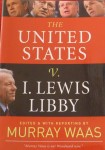Dan Froomkin on Patrick Fitzgerald’s Legacy as a Federal Prosecutor
Dan Froomkin, Senior Washington DC Correspondent for Huffington Post, has long been one of my favorite news aggregators and commentators. I first got to know his work in the early 2000s, when he wrote and edited the must-read, “White House Watch” at washingtonpost.com. WHW was a daily news digest entirely made up of news about the Bush White House, with Dan’s pithy commentaries about the stories he selected for his readers. I used to wait avidly each day until mid-morning when each new column would appear online. If I had a lunch date I had run to, I would print out the pages and take them with me on the subway.
This is Dan’s awesome archive of all the WHW columns he did–plus all the live chats he did–before his employment at the Post was ended in January 2009, one of the worst decisions, among many bad calls, that that newspaper made in the 2000s.
I got to know Dan personally shortly after I began working with Ambassador Joseph Wilson on the manuscript that would become his 2004 book The Politics of Truth: Inside the Lies that Led to War and Betrayed My Wife’s CIA Identity.* Dan and I haven’t been in touch the past few years, but I continue to enjoy reading him.

Yesterday Dan published a provocative column in which he laments the fact that federal prosecutor Patrick Fitzgerald only charged VP Cheney’s Chief of Staff Scooter Libby for obstruction of justice in the disclosure of Valerie Plame’s CIA identity, ultimately choosing to not put Karl Rove and/or Dick Cheney on trial. Froomkin reminds readers that
“Fitzgerald was appointed as a special prosecutor in late 2003 to investigate the July 2003 leak of Plame’s identity, which came during a White House effort to discredit her husband, former U.S. Ambassador Joe Wilson [who] was trying to expose how the administration had twisted intelligence to make its case for the war in Iraq, launched a few months earlier, and the White House was desperate to prevent that narrative from establishing itself before the 2004 elections. The evidence that came out at trial clearly established that Cheney was the first person to tell Libby about Plame’s identity and that Cheney wrote talking points that likely prompted Libby and others to raise Plame’s role with reporters.”
As is often the case with prosecutors, his decision may have come down to a calculation of what he could prove at trial, and what a jury would accept, beyond a reasonable doubt:
“In a subsequent court filing, Fitzgerald wrote that ‘there was reason to believe’ the leak had been coordinated by Cheney and that the vice president may have had a role in the cover-up. ‘When the investigation began, Mr. Libby kept the vice president apprised of his shifting accounts of how he claimed to have learned about Ms. Wilson’s CIA employment,’ Fitzgerald wrote. But Cheney was never charged. ‘I think the chances of it being a show trial and losing really weighed heavily on him, in terms of the political fallout,’ said Michael Genovese, director of Loyola Marymount University’s Institute for Leadership Studies.
Froomkin goes on to point out,
“For reasons he has never publicly explained, Fitzgerald ultimately chose not to indict Rove either for the leak or for obstruction of justice. While much could have been gleaned from key investigative documents requested by a congressional committee, the Bush White House wouldn’t let Fitzgerald release them.
Dan gives the last word in his column to one of the reporters who was most dogged about this case, Marcy Wheeler, whose commentary and reporting was then at firedoglake and can nowadays be found at Empty Wheel.
“Wheeler. . . one of the foremost chroniclers of the Libby trial, said Fitzgerald’s investigation didn’t go far enough. ‘The FBI agents believed that they had the case against Rove nailed down,’ Wheeler said. And Fitzgerald ‘actually had Dick Cheney in his teeth.’”
When Fitzgerald recently announced that he’s retiring from the corps of federal prosecutors, I expected to see postmortems of his career, though Froomkin’s is the first I’ve read. It seems that the last decade is already dim and distant in Americans’ memory, and in the minds of members of the media, even though so much of what happened in the terrible Bush years still hangs over us like a black cloud. What I’d really love to read, or even better edit, would be a manuscript by Fitzgerald, though I fear that’s unlikely from this career government lawyer, generally known for his circumspect nature. Still, he did let it all–or nearly all–hang out in one public statement about Cheney’s role in the Plame matter. Quoted here by Froomkin,
“In his closing arguments in the Libby case, Fitzgerald famously declared: ‘There is a cloud over what the vice president did that week. … That cloud remains because the defendant has obstructed justice and lied about what happened.’”
*Along with Wilson’s book, which became in part the basis for the movie, “Fair Game,” I also brought out the book The United States v. I. Lewis Libby, edited and with reporting by Murray Waas, the only published transcript of Scooter Libby’s trial. I recommend it along with Wilson’s book, and former Bush press secretary Scott McClellan’s What Happened: Inside the Bush White House and Washington’s Culture of Deception.

